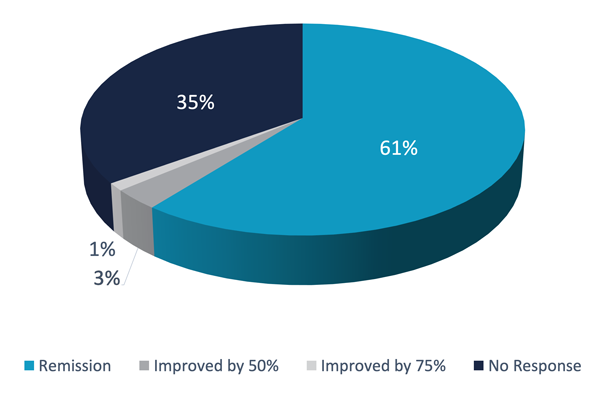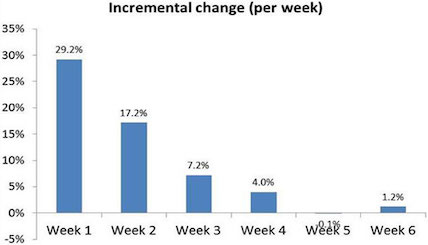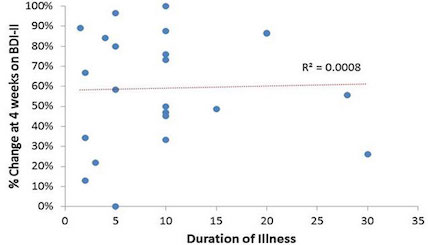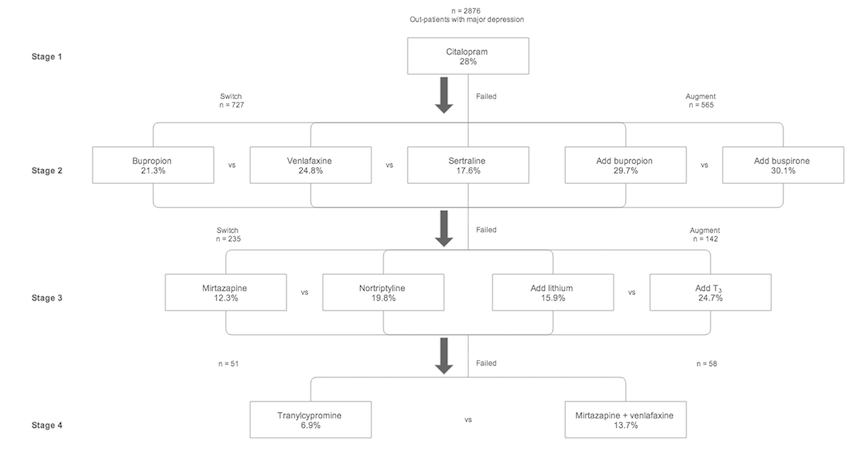

Figure 1a: The London Psychiatry Centre Recovery Rates

Figure 1b: Incremental Change (per week) in Patient Improvement

Figure 1c: Scatter Graph Comparing rTMS Treatment to Duration of Illness
At The London Psychiatry Centre we champion evidence-based treatments for psychiatric problems. We want to see our patients get well; as safely and swiftly as possible. When we decided to introduce repetitive Transcranial Magnetic Stimulation (rTMS) in our clinic it was with prolonged and careful study of the evidence from trials and data spanning several thousand patients in the USA and Canada.
We are pleased to say that our own early work with this ground-breaking treatment is bearing the same kinds of incredibly positive results. The chances of full recovery with multiple drug changes and cognitive behaviour therapy are at best up to 1/3, compared to 2/3 with rTMS at The London Psychiatry Centre in just four weeks.
At The London Psychiatry Centre, 59% of women and 62% of men who have been treated for Treatment-Resistant Depression (TRD) with rTMS have recovered.
We studied a sample of 252 of our patients with treatment-resistant depression in July 2020. These were patients who had been unable to achieve satisfactory results with antidepressant medication. 61% achieved remission (full recovery) within 6 weeks (4 weeks on average) and most were shown to be well for between 1-12 months with maintenance. 35% were non-responders to treatment, 3% responded and the symptoms were shown to have improved by 50% and 1% responded and their symptoms have improved by 75%. There have been no side effects noted.
When the STAR D patients were followed up for 12 months after completing their treatment, only 2.7% of patients were well and accounted for, compared to 45% with rTMS with maintenance. We therefore recommend maintenance to our patients in order to maximise the chances of staying well.
Note: The comparison results quoted above are when rTMS is compared with figures of the STAR-D protocol for the treatment of resistant depression, the most advanced evidence-based protocol in the world.
Such swift, sustained results in patients who have suffered, on and off, for an average 10 years of unrelenting depression, are staggering. In fact, we have found that rTMS patients can return to work within a few weeks of starting treatment – as opposed to the average of nine months with drug treatment, psychotherapy and ECT.
Figure 2 Remission Rates in STAR-D
The London Psychiatry Centre was the first clinic in the United Kingdom to provide patients with repetitive Transcranial Magnetic Stimulation (rTMS) treatment for depression.
At The London Psychiatry Centre we champion evidence-based treatments for psychiatric problems. We want to see our patients get well; as safely and swiftly as possible. When we decided to introduce repetitive Transcranial Magnetic Stimulation (rTMS) in our clinic it was with prolonged and careful study of the evidence from trials and data spanning several thousand patients in the USA and Canada.
We are pleased to say that our own early work with this ground-breaking treatment is bearing the same kinds of incredibly positive results. The chances of full recovery with multiple drug changes and cognitive behaviour therapy are at best up to 1/3, compared to 2/3 with rTMS at The London Psychiatry Centre in just four weeks.
 Figure 1a: The London Psychiatry Centre Recovery Rates
Figure 1a: The London Psychiatry Centre Recovery Rates
At The London Psychiatry Centre, 59% of women and 62% of men who have been treated for Treatment-Resistant Depression (TRD) with rTMS have recovered.
 Figure 1b: Incremental Change (per week) in Patient Improvement
Figure 1b: Incremental Change (per week) in Patient Improvement
We studied a sample of 252 of our patients with treatment-resistant depression in July 2020. These were patients who had been unable to achieve satisfactory results with antidepressant medication. 61% achieved remission (full recovery) within 6 weeks (4 weeks on average) and most were shown to be well for between 1-12 months with maintenance. 35% were non-responders to treatment, 3% responded and the symptoms were shown to have improved by 50% and 1% responded and their symptoms have improved by 75%. There have been no side effects noted.
 Figure 1c: Scatter Graph Comparing rTMS Treatment to Duration of Illness
Figure 1c: Scatter Graph Comparing rTMS Treatment to Duration of Illness
When the STAR D patients were followed up for 12 months after completing their treatment, only 2.7% of patients were well and accounted for, compared to 45% with rTMS with maintenance. We therefore recommend maintenance to our patients in order to maximise the chances of staying well.
Note: The comparison results quoted above are when rTMS is compared with figures of the STAR-D protocol for the treatment of resistant depression, the most advanced evidence-based protocol in the world.
 Figure 2 Remission Rates in STAR-D
Figure 2 Remission Rates in STAR-D
Such swift, sustained results in patients who have suffered, on and off, for an average 10 years of unrelenting depression, are staggering. In fact, we have found that rTMS patients can return to work within a few weeks of starting treatment – as opposed to the average of nine months with drug treatment, psychotherapy and ECT.
The London Psychiatry Centre was the first clinic in the United Kingdom to provide patients with repetitive Transcranial Magnetic Stimulation (rTMS) treatment for depression.
To talk to us about if rTMS treatment for depression is the best course of action for you, please don’t hesitate to give us a call on 020 7580 4224 and speak to a member of the team..

